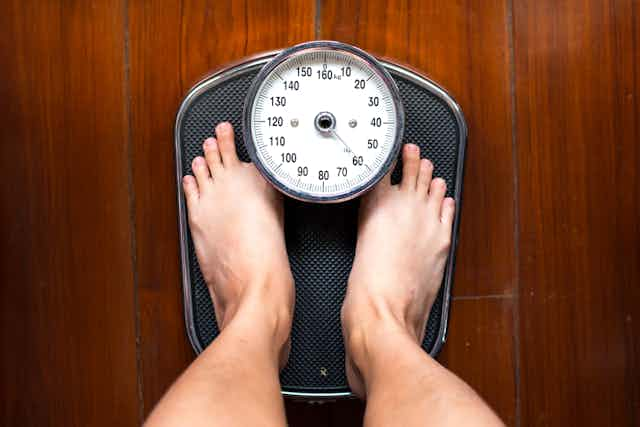With obesity on the rise, so too is the diet and weight loss industry, currently valued at US$70 billion in the US alone. But most of us are still confused about the factors that lead to weight gain.
Three commonly attributed factors are our genes, our microbiome (gut bugs) and our energy intake (kilojoules). So let’s examine how much each of these is to blame.
Read more: When we lose weight, where does it go?
Genes
On a species level, genes are implicated. But for individuals, genes don’t have as much of an effect as we may think. Let me explain.
Compared to our primate cousins, we humans are the “fat ape”. We store away more energy supplies in the form of body fat than gorillas, chimpanzees or orangutans. So the idea is that we have evolved to tuck away more fat energy to power our bigger brains.
However, for an individual, genes may not play such a huge role. About 100 genes so far have been linked to body weight, but together these explain less than 3% of variation in body mass index (BMI).
The biggest contributing gene, identified from genome-wide association studies, was the very logically named fat mass and obesity-associated gene (FTO). The BMI-increasing FTO variant is relatively common, present in up to 42% of the population and may add an extra kilogram or so to body weight.
However, this FTO gene only explains 0.3% variation in BMI. The even better news is people with this variant can lose weight just as easily through eating less and moving more.
So it’s good to remember genes don’t operate in isolation, but in cahoots with the food we eat and the physical activity we do.
Gut bugs
It’s a rather odd thought that we share our bodies with 30 trillion or so bacteria. That’s about one bug for each one of our human cells. Many of these bugs live in our guts and their effect on various ailments, including obesity, is being studied intensively.
Probiotic supplements contain living bacteria, such as Lactobacillus, and prebiotics are a type of fibre that may improve gut health by favouring the growth of more gut-friendly strains of bacteria.
A summary of 13 studies found taking probiotic supplements for up to three months reduced body weight by 0.6 kg on average. Another recent summary of 18 studies combining data from treatments with prebiotics and/or probiotics came to a similar conclusion. That is, there was only an average 0.6 kg decrease in body weight.
Another, perhaps less palatable way to improve the profile of our gut bugs is by poo transplantation. However, we must await large systematic studies of poo transplants on weight loss before we can say if they help or not.
Read more: Explainer: what is the gut microbiota and how does it affect mind and body?
Kilojoules
We often hear about energy intake referred to as calories, but the metric unit of measure is the joule, with one Calorie equalling 4.2 kilojoules.
In theory, if you decrease the kilojoules you consume by 10%, you should lose 10% body weight.
This theory was put to the test and found to be accurate by a study on 117 healthy participants over two years.
Conversely, elevated energy intake predicted weight gain in 253 participants followed over two years. The energy intake had to be carefully and objectively measured, as self-reporting underestimated energy intake by 35%.
If a kilojoule is a kilojoule, you should also be able to lose weight just the same if the kilojoule comes from fat or from carbohydrate, as long as there are fewer kilojoules overall. And that’s pretty much what was found in a summary of 32 controlled feeding studies, which compared different ratios of fat to carbohydrate but had the same reduced energy intake.
So our genes and gut bugs can influence weight gain, but the effects are relatively modest. Kilojoules, on the other hand, hold the master key to body weight regulation. Weight gain occurs when more kilojoules are consumed as food, rather than used for fuel.
Read more: Why we regain weight after drastic dieting

